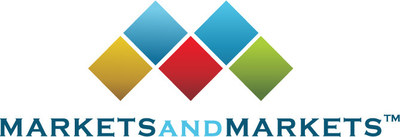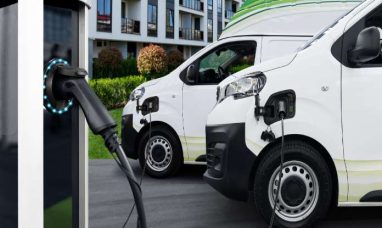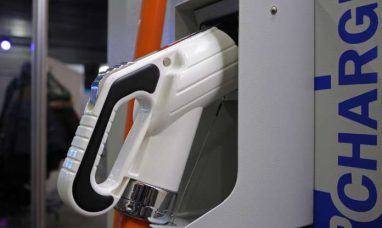CHICAGO, July 26, 2023 /PRNewswire/ — Electric Vehicle Market is projected to grow from USD 388.1 billion in 2023 to USD 951.9 billion by 2030, registering a CAGR of 13.7%, according to a new report by MarketsandMarkets™. The electric vehicle (EV) market is experiencing a remarkable surge in growth, revolutionizing the global automotive industry. With an increasing focus on sustainability and reducing greenhouse gas emissions, governments and consumers alike are embracing the transition to electric mobility. Advancements in battery technology, charging infrastructure, and improved driving range have alleviated the concerns of range anxiety, boosting consumer confidence in EV adoption. Additionally, favorable government policies, incentives, and advancements in manufacturing processes have contributed to making EVs more accessible and affordable to the masses. At present, companies such as BYD (China), Tesla (US), Volkswagen AG (Germany), SAIC Motors (China), and Stellantis (Netherlands), among others. These companies manufacturers EVs and EV components.

Download PDF Brochure: https://www.marketsandmarkets.com/pdfdownloadNew.asp?id=209371461
Browse in-depth TOC on “Electric Vehicle Market“.
130 – Tables
85 – Figures
310 – Pages
Electric Vehicle Market Scope:
|
Report Coverage |
Details |
|
Market Size |
USD 951.9 billion by 2030 |
|
Growth Rate |
13.7% of CAGR |
|
Largest Market |
Asia Pacific |
|
Market Dynamics |
Drivers, Restraints, Opportunities & Challenges |
|
Forecast Period |
2023-2030 |
|
Forecast Units |
Value (USD Billion) |
|
Report Coverage |
Revenue Forecast, Competitive Landscape, Growth Factors, and Trends |
|
Segments Covered |
Components, Vehicle Type, Vehicle Class, Top Speed, Vehicle Drive Type, EV Charging Point Type, Vehicle Connectivity, End Use, Propulsion and Region. |
|
Geographies Covered |
Asia Pacific, Europe, North America, Middle East & Africa |
|
Report Highlights |
Updated financial information / product portfolio of players |
|
Key Market Opportunities |
Rising demand for electric vehicles in the automotive and transportation sectors |
|
Key Market Drivers |
Reducing prices of EV batteries will increase demand for EVs by making them cost effective |
Commercial vehicles to be the fastest growing market by volume during forecast period
The commercial vehicle segment includes LCVs and HCVs. HCVs combine two categories of vehicles − heavy trucks and buses & coaches. The nature of these vehicles limits their production volumes and growth rates as they are used in specific applications such as logistics, construction, and mining industries. On the other hand, LCVs have come a long way from having bare-essential features to full-blown utility vehicles that can be used for passengers as well as commercial purposes. The majority of used LCVs and HCV’s include vans, mini-buses, pickups, trucks etc. Various companies such as Volvo Group, Daimler AG, Traton Group, BYD, Nikola Motor, Tesla, DAF Trucks, etc. already have EV models available or are currently under development. For instance, in May 2022, Stellantis and Toyota Motor partnered to develop a new large-size commercial van, including a battery electric version. This collaboration completes a full lineup of light commercial vehicles (LCV), consisting of compact, mid-size, and now a large-size LCV. Similarly, ZF’s Commercial Vehicle Solutions (CVS) department unveiled ‘AxTrax 2’ and ‘AxTrax 2 dual’ electric central drive system designed for various types of vehicles, ranging from light delivery vans to heavy-duty trucks and trailers. Increasing sales of electric buses, particularly in China, has contributed to the growth of the electric bus segment. In the near future, several countries are expected to replace their existing fuel-based bus fleets with electric buses. The increasing trend of the replacement of fossil fuel-based public transport fleets with electric buses is expected to drive the growth of electric commercial vehicle market during the forecast period. Additionally, the growth of e-commerce, logistics, and shared mobility are expected to drive the growth of electric commercial vehicles during the forecast period. Electric vans are expected to witness significant growth in Europe and Asia owing to their extensive use in businesses. In the coming years, EV LCVs are expected to be the fastest-growing market.
FWD to be the largest market during the forecast period
A front wheel drive vehicle has the transmission system attached to its front axle and wheels. It is significantly cheaper to design and produce compared to other wheel drives. The vehicle is therefore cheaper for consumers. Most front wheel drives provide better mileage compared to rear wheel drives as the weight of the drivetrain is lower than that of the rear wheel drive. They also provide better traction as the weight of the engine and transmission are over the front wheels. This makes the vehicle easier to operate in difficult weather conditions such as snow and heavy rain. However, the handling of these vehicles is harder compared to other drives, especially at faster speeds. In 2022, there were total sales of 1.8 million FWD EV cars in Asia Pacific followed by 0.3 million in Europe and 0.04 million in North America. BYD Song Pro/Plus was the second best-selling passenger car worldwide which has a FWD type. Some popular FWD EVs include BYD Qin Plus, BYD Han, Tesla Model Y, BYD Donphin, Tesla Model 3, BYD Yuan Plus EV, BYD Tang, Tesla Model Y, Tesla Model 3, GAC Aion Y, GAC Aion S, Changan Benni EV, Chery QQ Ice Cream, Hozon Neta V EV, Chery EQ 1 etc. These vehicles are better suited for places with high traffic, metro cities, etc. Most mini EVs including GW Black Cat, GW White Cat and GW Good Cat are sold under FWD specification. These 3 cars sold well in the past few years. FWD EVs were relatively high in use in the past due to manufacturers simply converting their existing ICE vehicle structure to EV by replacing parts during production. This worked well in the initial shift to EVs when manufacturers were not sure about plans to develop EVs fully.
“Middle East and Africa is expected to be the fastest growing market in the EV market”
The Middle East & Africa region has started giving importance to the electric vehicle industry in the recent past. Governments of countries such as the UAE, Egypt, South Africa, and Cyprus have been working on growing their EV demand and EV charging stations across the region. These countries have provided incentives for EV buyers. Companies such as Tesla, Geely, Toyota, Volkswagen, and Nissan are leading this market. A large share of the EVs sold in this region are bought from China and Europe. Due to the low power prices in these regions, the cost of fuel for EVs reduces significantly, but the vehicle ownership costs make up for much of the difference. There is an advantage for the use of EVs in the Middle East: the urban areas are closer together and an 80% charge on a decent EV enables travel wherever needed within the states. The rising disposable incomes of people in this region along with the need for emission reductions has led to an increase in the demand for EVs in the last few years. The UAE for instance, plans to add over 42,000 EVs in Dubai by 2030. The country also plans to be among the world leaders in developing charging stations. It plans to provide free EV charging till 2025 to promote the EV market. The EV market in the Middle East & Africa is led by countries such as South Africa and the UAE while Egypt is a newly growing market. These countries are working towards developing demand and the adoption of EVs to reduce dependence on petrol in the coming years. These countries are also developing EV charging stations across their regions to cater to the upcoming demand for EVs.
Inquire Before Buying: https://www.marketsandmarkets.com/Enquiry_Before_BuyingNew.asp?id=209371461
Key Market Players:
The EV companies are BYD (China), Tesla (US), Volkswagen AG (Germany), SAIC Motors (China), and Stellantis (Netherlands), among others.
Recent Developments:
- In June 2023, PowerCo, a subsidiary of Volkswagen Group, has partnered with Koenig & Bauer to develop a revolutionary technology for battery cell production. The collaboration aims to create a roller press for powder coating electrodes on a large industrial scale, eliminating the need for wet-coating and subsequent drying processes. This Dry Coating procedure significantly reduces energy consumption and eliminates the use of chemical solvents. PowerCo is currently testing and optimizing the technology in a pilot line in Northern Germany. The new procedure has the potential to save approximately 30% of energy and 15% of floor space, and the use of chemical solvents.
- In June 2023, Stellantis and Foxconn have announced the establishment of a joint venture called SiliconAuto. The 50/50 partnership aims to design and sell advanced semiconductors for the automotive industry, including Stellantis, starting in 2026. By combining Foxconn’s expertise in the ICT industry with Stellantis’ deep understanding of global mobility needs, SiliconAuto will provide a dedicated source of semiconductors for computer-controlled features and modules.
- In May 2023, BYD and Toyota have formed a strategic partnership to collaborate on the production and sale of electric vehicles (EVs). Toyota aims to leverage the expertise of the well-established local company, BYD, and benefit from their advanced battery technology in this joint venture.
- In April 2023, Tesla has announced its plan to potentially partner with CATL, a prominent battery manufacturer in China, to establish a US-based factory to comply with the Inflation Reduction Act set forth by the Biden administration. The specific location of the factory is yet to be confirmed, but Texas or California are strong contenders due to their proximity to Tesla’s assembly lines.
- In April 2023, Volkswagen has announced a partnership with Shell Germany to expand the charging infrastructure for electric mobility. The collaboration has resulted in the installation of the first 150 kW Elli Flexpole charging station at a Shell service station in Göttingen on May 4, 2023. This innovative charging station, developed by Volkswagen’s brand Elli, features a unique battery storage system that allows it to connect to a low-voltage grid. This technology enables easy and flexible installation of charging stations while accelerating grid expansion. Following a successful test operation
- In January 2023, BMW Group and Solid Power have entered a partnership for the next phase of their joint research and development efforts towards the adoption of solid-state batteries (ASSB) in series production vehicles. As part of an expanded Joint Development Agreement, BMW will establish an ASSB prototype line at its Cell Manufacturing Competence Center (CMCC) in Munich. This collaboration aims to enhance the design and manufacturing capabilities of all-solid-state batteries, with both companies conducting complementary cell development and manufacturing activities.
Get 10% Free Customization on this Report: https://www.marketsandmarkets.com/requestCustomizationNew.asp?id=209371461
Browse Adjacent Market: Automotive and Transportation Market Research Reports & Consulting
Related Reports:
Electric Commercial Vehicle Market – Global Forecast to 2030
EV Charging Station Market – Global Forecast to 2027
Electric Scooter and Motorcycle Market – Global Forecast to 2028
E-bike Market – Global Forecast to 2028
About MarketsandMarkets™:
MarketsandMarkets™ is a blue ocean alternative in growth consulting and program management, leveraging a man-machine offering to drive supernormal growth for progressive organizations in the B2B space. We have the widest lens on emerging technologies, making us proficient in co-creating supernormal growth for clients.
The B2B economy is witnessing the emergence of $25 trillion of new revenue streams that are substituting existing revenue streams in this decade alone. We work with clients on growth programs, helping them monetize this $25 trillion opportunity through our service lines – TAM Expansion, Go-to-Market (GTM) Strategy to Execution, Market Share Gain, Account Enablement, and Thought Leadership Marketing.
Built on the ‘GIVE Growth’ principle, we work with several Forbes Global 2000 B2B companies – helping them stay relevant in a disruptive ecosystem. Our insights and strategies are molded by our industry experts, cutting-edge AI-powered Market Intelligence Cloud, and years of research. The KnowledgeStore™ (our Market Intelligence Cloud) integrates our research, facilitates an analysis of interconnections through a set of applications, helping clients look at the entire ecosystem and understand the revenue shifts happening in their industry.
To find out more, visit www.MarketsandMarkets™.com or follow us on Twitter, LinkedIn and Facebook.
Contact:
Mr. Aashish Mehra
MarketsandMarkets™ INC.
630 Dundee Road
Suite 430
Northbrook, IL 60062
USA: +1-888-600-6441
Email: [email protected]
Research Insight: https://www.marketsandmarkets.com/ResearchInsight/ev-component-and-infrastructure-market.asp
Visit Our Website: https://www.marketsandmarkets.com/
Content Source: https://www.marketsandmarkets.com/PressReleases/ev-component-and-infrastructure.asp
Logo: https://mma.prnewswire.com/media/660509/MarketsandMarkets_Logo.jpg
![]() View original content:https://www.prnewswire.co.uk/news-releases/electric-vehicle-market-worth-951-9-billion-by-2030—exclusive-report-by-marketsandmarkets-301886005.html
View original content:https://www.prnewswire.co.uk/news-releases/electric-vehicle-market-worth-951-9-billion-by-2030—exclusive-report-by-marketsandmarkets-301886005.html

Featured image: DepositPhotos © Chinnapong















